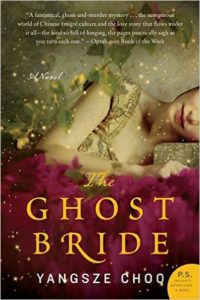 The Ghost Bride, by Yangsze Choo
The Ghost Bride, by Yangsze Choo
Synopsis: At the turn of the century, a young girl must marry the dead son of a rich family to save her father from ruin, but he’s a total jerk.
Book Review: An interesting animal! First, this book feels like an Urban Fantasy that’s set in an early 1900s Chinese colonial holding rather than in modern-day Chicago. It’s a neat blending of modern style and old setting.
The thing I most enjoyed about this book was its exploration of the afterlife mythology of this culture. It’s not exactly Chinese, and not exactly Malaysian, but kinda a blending of the two that happened in that time/place. I am almost entirely ignorant of that mythology, so seeing their afterlife beliefs coming to life in these pages was entirely fascinating. It’s very much the Bureaucratic Hell version of afterlife, except everyone goes there. Then they suffer through a century or so of paperwork and red tape and corrupt government officials until they die for real. Not the worst of tortures, but certainly not a pleasant afterlife. :) Almost every chapter had something new and fascinating that kept my interest. And the prose is basically well done, in some places slipping into cliché, in other places really shining.
The thing about this novel though… well, just a week or so before I read it I came across this essay about the Basic Girl Story (as compared to the Basic Boy Story), and I’m glad I did, because it put everything into perspective. (OK, tumblr post, but basically an informal essay)
The Basic Boy Story is “common boy is found to be Special, with Special Powers or Destiny or some such. He gets training under a mentor, pushes his abilities to new levels, and completes some difficult task. He returns to his home town as a much-lauded hero.”
The Basic Girl Story is “common girl is found to be Special, with Special Powers or Destiny or some such. She meets a Gruff Loner. She is put in danger several times, and in each case rescued because she is Precious and Worth Rescuing. In the end she and Gruff Loner fall in love, the danger passes, and the most significant change in her life is that now she’s happy.”
The essay itself compares The Matrix to Jupiter Ascending as the two Basic story examples, and it’s interesting and short. But the main point is that neither story is bad, they are just… basic. We’ve seen them both a hundred times. There’s no shame in enjoying them, they are so basic because they are widely enjoyable! But unless they incorporate some sort of radical twist or concept (like The Matrix had), they won’t cover new ground.
The Ghost Bride is the essence of a good Basic Girl Story. It hits every beat, and if you’ve read a few of these before, you can see everything coming from a mile away. I knew when the Gruff Loner was removed from the story that he wasn’t really gone for good – he had to come back for the declaration of love at the end. But I was hoping maybe, MAYBE our protagonist would solve at least one problem by herself now. Nope. He’s back before you know it to save her yet again. Ah well, I shouldn’t have gotten my hopes up. :)
If you like that sort of story, this really is a great execution of it! And the interesting world makes up for a lot. But it doesn’t really grab me, Not Recommended.
Book Club Review: The book isn’t bad for book clubs. The exposure to a foreign mythology is really neat, and it’s a fast read, and not an unenjoyable one. There are a couple things to talk about, such as how much society has progressed since the time when it was hard to marry off a nearly-spinsterly 18-year-old girl.
I personally was bothered by how the book strongly pushed the narrative of “parents have an obligation to sacrifice everything for the child’s happiness.” I realize that parents sacrifice a lot, and this is generally good. But Choo seemed to speak very approvingly of a young mother who committed suicide so that her daughter could marry the guy she wanted to. That’s really overdoing it IMHO. You don’t have an obligation to kill yourself so your bratty 14 year old can run off with her True Love. These over-the-top sacrifices, and the entitlement of the children to them, really rubbed me the wrong way. That sparked a fair bit of conversation. However I think this was a peculiarity of my own, and most people wouldn’t think that much of it, and wouldn’t make it a talking point.
All things considered, it isn’t bad. No one disliked it. Most people weren’t significantly excited by it either though, so I can’t give an Enthusiastic Consent recommendation. Ultimately, Not Recommended.
